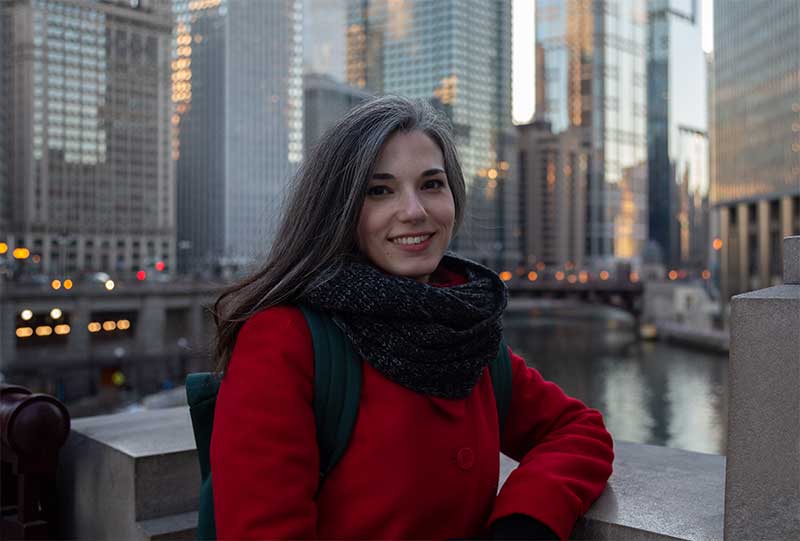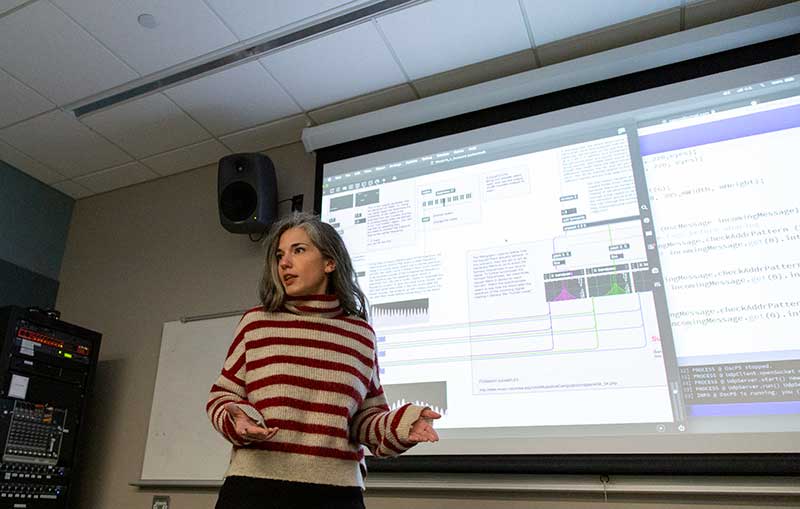Meet the CT - Zeynep Özcan
In this article, we get a chance to meet our newest Max Certified Trainer: Zeynep Özcan. Zeynep comes to us from Ann Arbor, Michigan, and is also teaching in many other locations (as well as virtually). Let's learn more!

Darwin: Thanks, Zeynep, for joining the CT program. I'm curious - what kind of work do you do that made you want to be a CT, and what embedded you in the Max world?
Zeynep: I'm very much involved with introducing music technology to young women. So I thought "Why not?" I feel it is important to be visible and be part of the program - so that later maybe others can feel like "I can do that as well!"
When I was a grad student, I heard weird comments all the time: "Why… you are good at Max!" "Oh, Max is not suited for girls. Why don't you just play a piano and sing?". I mean people are OK if you want to be on stage to play instrument or sing, but it is still confusing for some if you interested in music technology.
Back then, I did not even realize what was going on. But now I live in another country and I'm a teacher at a university, and I’m also teaching teenagers. And I started to think it's the same, that nothing is changing. For example, even though they're all beginners, male students usually jump in and feel more comfortable exploring, especially when it comes to coding. I was reading Reshma Saujani’s book, Brave Not Perfect. She mentions similar problems. This book inspired me to be actively doing something about this - which is harder than complaining about what is wrong.
What are some of the places where you teach?
One place was called "Women In Sound in New York", but they are about to rebrand. It was a community that was doing workshops before COVID. I thought if I was in New York, maybe I could go there and check out their place and do a workshop - and then COVID happened. So then I suggested they could move into online teaching. "What if I create a month of curriculum for the students?" It was challenging, though, because I had gotten used to teaching 15 week-long curriculum.
At first, we were thinking that people would not be committed to month-long courses, but they were! So I just kept building courses, creating five different courses for them in Max, Processing and electronic music composition. Our purpose was basically to offer an affordable but college-level education as an alternative to watching YouTube videos. I mean, videos are good, but they don't necessarily provide something like deep beginner-level courses.
It is important to create learning environments exclusively for female-identifying and non-binary individuals. It helps to create a sense of community through learning together. And now I see my students collaborating with each other or doing their own shows. Seeing them working with Max is unbelievable. I'm so happy about it.

How did you yourself get interested in Max?
It took me a while to accept the fact that I am a sound artist/electronic music composer who is interested in sound. It might be challenging for the audience to listen to the more experimental side of electronic music, but it was also challenging for me to understand why I like it, and why I find it more intuitive to use sound to tell a story.
Many years ago, I was a performer/musician doing academic research in Architectural History and Music. But the ultimate goal was to compose music, have an album and tour. You know - like a musician! But when it comes to composing my own work, it just sounded too abstract, and I had no idea why. But I was doing research in architectural history, and I was studying [Iannis] Xenakis' work, both his buildings and his electronic music composition. And I started to learn about electronic music history. Then I started to learn about early synthesis methods. And I thought, “Can this be music?”
I listened to people like [Morton] Subotnik or like [Bernard] Parmegiani - these are my favorite OG electronic music composers. I am convinced that this is an amazing field for artistic expression. I also thought, “I've liked music since I was a kid, so I'm going to do this. I'm going to study music.”
So I started to compose electronic music, and I also was into spatialization (because I'm still heavily influenced by Xenakis' work). I started composing pieces for specific spaces. And then, just using an instrument or recording sounds and manipulating sounds started not to be enough. I thought, "Okay, I need to synthesize my own sounds." So, I started to learn Max to have a control over the whole sound. Because when you have an idea about the specific sound or an environment you build that makes music, sometimes just recording is not enough. You just want to work on your own synthesis.
So you came at Max from music and sound development, but Max provides inroads into other media arts, whether it's sensors or it's visuals or other things like that. Are there other parts of Max that you’ve explored? Or other parts of Max that you have used to bring the outside world into your musical work?
If am working with multimedia doing a data sonification or generative music, I usually combine Max with Processing. I use Max as a sonification engine and Processing to simulate artificial environments. If I am working with sensors, I am using Max to make sound. Depending on the project, I get the raw output from Max and finalize the project in Live. If I am composing, all three software packages are like different instruments for me. It is like choosing to write a violin piece instead of piano. Sometimes you use choose to write it for Max.
Also, I explored gen~ for educational purposes — for filter design, for example. When I had to explain filters, I thought, “What if I just take the algorithm and implement it again?" The biquad, and other filters— they're just algorithms anyway. So I thought I could implement them in gen~ and take a screenshot. For the more advanced students, they can just look at how a filter actually works, how delays actually work, and what feedback and feedforward are. So I mainly used gen~ for that purpose.
It sounds like you actually teach a wide variety of technologies to help people get their work done, right?
The challenge, I believe, is to create very short courses or to offer one-day workshops. One day of a workshop versus a month of classes - the purpose of each one is different.
I want to just give students some kind of skill at the end of the workshop - and some kind of excitement. So when they go back home, they can say, "Oh, that has so much potential." They can do it, but you cannot just give them all of that potential at once.
I usually make them fill out a form beforehand so that I can know their background. So, for example, if we have six dancers, I will move toward using sensors and live manipulation. If we have musicians, I know they're going to perform and maybe they want to use Max for real time synthesis. Or, if they are music producers, then I encourage Max for Live so that they can use it in their digital workstation as well.
Right now you're teaching at University of Michigan. You've got all these workshops that you've developed, and you're working with different groups. What do you have planned for your own personal art making and music-making?
Recently, for my more multimedia kind of work, I converted my old autonomous artificial ecosystem into a performance tool. This way, I can interact with the organisms instead of the audience. I also wanted to get rid of using a Kinect in the system for a while.
I'm going to keep doing my electronic music compositions and I think maybe I can create some kind of album. I don't know who's going to sit at home and listen to electronic music, but we'll see.
My latest work is about me getting used hearing another language and getting comfortable expressing myself in another language. As I composed this piece (called Tuning of my world), I have realized there are a lot of parallels between me getting used to another language and finally accepting my interest in sound as a composer. That’s why I think this composition is the most personal piece I've ever made.
I have a few art installation ideas, but I'm not sure if it's possible to actually create them or if I am just imagining them. If I can’t make them happen as an artwork, I may write them as short stories. I guess this is one of the perks of being a multidisciplinary artist.
I also want to build a community-based on music tech, teaching music tech, and making a place where people can perform and talk about this stuff in Michigan and the Midwestern US.
For more information, visit Zeynep's website and Soundcloud .
by Darwin Grosse on 2021年12月1日

